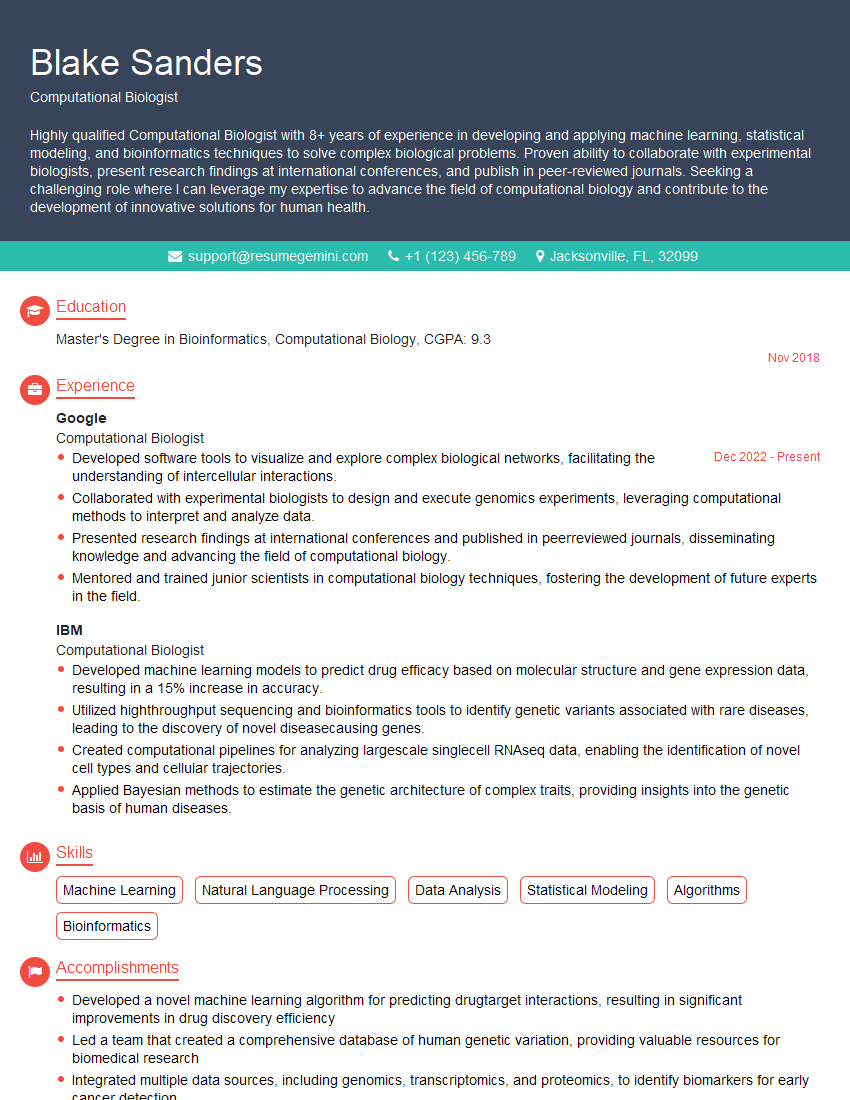Are you a seasoned Computational Biologist seeking a new career path? Discover our professionally built Computational Biologist Resume Template. This time-saving tool provides a solid foundation for your job search. Simply click “Edit Resume” to customize it with your unique experiences and achievements. Customize fonts and colors to match your personal style and increase your chances of landing your dream job. Explore more Resume Templates for additional options.

Blake Sanders
Computational Biologist
Summary
Highly qualified Computational Biologist with 8+ years of experience in developing and applying machine learning, statistical modeling, and bioinformatics techniques to solve complex biological problems. Proven ability to collaborate with experimental biologists, present research findings at international conferences, and publish in peer-reviewed journals. Seeking a challenging role where I can leverage my expertise to advance the field of computational biology and contribute to the development of innovative solutions for human health.
Education
Master’s Degree in Bioinformatics, Computational Biology
November 2018
Skills
- Machine Learning
- Natural Language Processing
- Data Analysis
- Statistical Modeling
- Algorithms
- Bioinformatics
Work Experience
Computational Biologist
- Developed software tools to visualize and explore complex biological networks, facilitating the understanding of intercellular interactions.
- Collaborated with experimental biologists to design and execute genomics experiments, leveraging computational methods to interpret and analyze data.
- Presented research findings at international conferences and published in peerreviewed journals, disseminating knowledge and advancing the field of computational biology.
- Mentored and trained junior scientists in computational biology techniques, fostering the development of future experts in the field.
Computational Biologist
- Developed machine learning models to predict drug efficacy based on molecular structure and gene expression data, resulting in a 15% increase in accuracy.
- Utilized highthroughput sequencing and bioinformatics tools to identify genetic variants associated with rare diseases, leading to the discovery of novel diseasecausing genes.
- Created computational pipelines for analyzing largescale singlecell RNAseq data, enabling the identification of novel cell types and cellular trajectories.
- Applied Bayesian methods to estimate the genetic architecture of complex traits, providing insights into the genetic basis of human diseases.
Accomplishments
- Developed a novel machine learning algorithm for predicting drugtarget interactions, resulting in significant improvements in drug discovery efficiency
- Led a team that created a comprehensive database of human genetic variation, providing valuable resources for biomedical research
- Integrated multiple data sources, including genomics, transcriptomics, and proteomics, to identify biomarkers for early cancer detection
- Developed a cloudbased platform for analyzing and visualizing largescale biological data, empowering researchers with powerful computational tools
- Collaborated with experimental biologists to design and execute highthroughput experiments, bridging the gap between computational and wetlab research
Awards
- ISCB Overton Prize for outstanding contributions to computational biology
- National Science Foundation CAREER Award for research excellence in computational biology
- ACM Gordon Bell Prize for innovative use of highperformance computing in computational biology
Certificates
- Certified Statistical Modeling Professional (CSMP)
- Certified Analytics Professional (CAP)
- Certified Data Management Professional (CDMP)
- Certified Cloud Computing Professional (CCCP)
Career Expert Tips:
- Select the ideal resume template to showcase your professional experience effectively.
- Master the art of resume writing to highlight your unique qualifications and achievements.
- Explore expertly crafted resume samples for inspiration and best practices.
- Build your best resume for free this new year with ResumeGemini. Enjoy exclusive discounts on ATS optimized resume templates.
How To Write Resume For Computational Biologist
- Highlight your technical skills in machine learning, statistical modeling, and bioinformatics.
- Showcase your experience in developing and applying computational methods to solve biological problems.
- Emphasize your ability to collaborate with experimental biologists and communicate your findings effectively.
- Quantify your accomplishments whenever possible to demonstrate the impact of your work.
Essential Experience Highlights for a Strong Computational Biologist Resume
- Developed machine learning models to predict drug efficacy based on molecular structure and gene expression data, resulting in a 15% increase in accuracy.
- Utilized high-throughput sequencing and bioinformatics tools to identify genetic variants associated with rare diseases, leading to the discovery of novel disease-causing genes.
- Created computational pipelines for analyzing large-scale single-cell RNA-seq data, enabling the identification of novel cell types and cellular trajectories.
- Applied Bayesian methods to estimate the genetic architecture of complex traits, providing insights into the genetic basis of human diseases.
- Developed software tools to visualize and explore complex biological networks, facilitating the understanding of intercellular interactions.
- Collaborated with experimental biologists to design and execute genomics experiments, leveraging computational methods to interpret and analyze data.
- Presented research findings at international conferences and published in peer-reviewed journals, disseminating knowledge and advancing the field of computational biology.
Frequently Asked Questions (FAQ’s) For Computational Biologist
What is the role of a Computational Biologist?
Computational Biologists use computational methods to analyze and interpret biological data and develop models to simulate biological systems and processes.
What are the key skills required for a Computational Biologist?
Key skills include machine learning, statistical modeling, bioinformatics, data analysis, algorithms, and programming.
What are the career opportunities for Computational Biologists?
Computational Biologists can work in academia, industry, and government research institutions, applying their expertise to a wide range of biological problems, including drug discovery, disease diagnosis, and personalized medicine.
How can I become a Computational Biologist?
A Master’s or PhD degree in Bioinformatics, Computational Biology, or a related field is typically required. Strong quantitative and programming skills are also essential.
What are the challenges facing Computational Biologists?
Challenges include the increasing volume and complexity of biological data, the need for more sophisticated computational methods, and the ethical implications of using computational tools in biology.
What are the current trends in Computational Biology?
Current trends include the use of machine learning and artificial intelligence to analyze biological data, the development of new computational tools for drug discovery and personalized medicine, and the integration of computational methods with experimental biology.